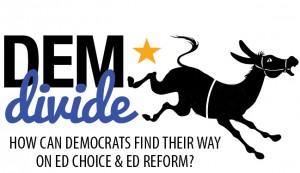The recent ruling in Vergara v. State of California once again highlighted growing tensions in the Democratic Party between two key constituencies: Teachers unions on the one hand; low-income, black and Hispanic families on the other.
 Is there a path to reconciliation? We asked folks who have thought about that a lot. Next week, we’ll run their responses.
Is there a path to reconciliation? We asked folks who have thought about that a lot. Next week, we’ll run their responses.
Here’s the prompt:
In the Vergara decision, Los Angeles Superior Court Judge Rolf Treu took a clear-eyed view of teacher employment policies that too often saddle low-income students with the least effective teachers. “The evidence is compelling,” he wrote. “Indeed, it shocks the conscience.” Yet those policies have long enjoyed full-throated support from teacher unions and their Democratic allies.
A similar rift exists over educational choice. Blacks and Hispanics are embracing charter schools, vouchers, and tax credit scholarships, which parental choice supporters see as expanding opportunity and empowerment of low-income families. But teacher unions, facing loss of market share and political power, are fighting every step of the way.
Democratic lawmakers are increasingly caught in the middle, and increasingly torn. Straddling the divide is becoming more and more difficult as more and more black and Hispanic parents benefit from charters and vouchers – and publicly raise their voices in support.
So, what’s the solution? Can Democrats continue to stiff-arm minority constituencies on ed policy without repercussion? Is there real risk in black and Hispanic voters turning to the more reform-friendly confines of the Republican Party? How long before something gives?
Should/can Democrats write off the teacher unions? Should the ed reform community more actively recruit reform-friendly Democrats for primary challenges? Or should they more aggressively push unions to modify their organizing model to better align with a public education system that is becoming more customized and decentralized?
Read the Dem Divide series below
Gloria Romero: Money leads Democrats to put teachers unions over poor kids
Ben Austin: Democratic leaders will follow parents on ed reform, eventually
Richard Whitmire: Houston & D.C. offer paths for ed reform Democrats
Joe Williams: Suburbs hold key to resolving Dem tensions over school choice
Myles Mendoza: Rahm Emanuel offers lesson for Democrats on ed reform
Rep. Marcus Brandon: African-Americans must blaze own path on school choice, ed reform
Doug Tuthill: New type of teacher union is key to relieving Democratic tensions

If the long-range outcome of Vergara were merely the death of tenure and LIFO, the servile posture of the lower-income family would be unaltered.
The recent opinion in Vergara v. California deserves the attention it has attracted – and more. It has implications – some good – beyond the weakening of public sector unions. The plaintiff child has successfully attacked both the state's system for tenuring and de-tenuring teachers and also the LIFO (last in, first out) statute that, in case of layoffs, protects teachers by time of service. If upheld on appeal, that would be a heap of change in the structure.
The court says the tenuring process is too short to allow good administrative judgment – effectively one year and a half. Thereafter, the de-tenuring process is torturous, very long, unpredictable – and expensive – to the district (the union covers teachers’ defense costs). Both practices are held to impair the quality of instruction and to do so in a manner uneven from child to child, thus violating their "fundamental right to equality of the educational experience.” These systemic wrongs are aggravated in districts serving low-income populations, intensifying the violation of equal protection. The seniority system (LIFO) has similar effects with the same conclusion. The case involves state law only. In striking down the tenure part of the system, Judge Rolf Treu emphasized these two sections of the state constitution:
Article I, Section 7(a): "A person may not be ... denied equal protection of the law."
Article IX, section (5): 'The legislature shall provide for a system of common schools ... supported in each district.”
He used both sources again in condemning LIFO. Favoring seniority, it is said, offends rationality and, like tenure, injures children without justification – especially the poor. Taken altogether, this is not equal protection.
I will address the two holdings in order, concentrating upon the tenure problem. As for the flaws in these statutes, Judge Treu relies on precedent construing the educational right of the child and the corresponding duties of the state. The (state) constitution "is the ultimate guarantee of a meaningful educational opportunity ... to the student" who also enjoys a "fundamental right to basic equality in public education.” The court thus perceives the right, first, as one of peculiar weight and significance; hence, second, one that must be satisfied by education of basically similar and proper quality for children in similar circumstances.
The history of judicial response to this two-fold claim in the courts of California is instructive. (more…)